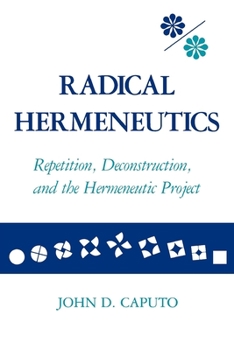Radical Hermeneutics
Select Format
Select Condition 
Book Overview
Radical Hermeneutics forges a closer collaboration between hermeneutics and deconstruction than has previously been attempted. For John D. Caputo, hermeneutics means radical thinking without transcendental justification: attending to the ruptures and irregularities in existence before the metaphysics of presence has a chance to smooth over them.
Format:Paperback
Language:English
ISBN:0253204429
ISBN13:9780253204424
Release Date:January 1988
Publisher:Indiana University Press (Ips)
Length:336 Pages
Weight:0.15 lbs.
Dimensions:0.9" x 6.2" x 9.2"
Customer Reviews
3 ratings
totality and the flux
Published by Thriftbooks.com User , 19 years ago
The central questioning of Radical Hermeneutics revolves around the question of the flux, the contingent, flowing reality that philosophy has traditionally tried to stem/structure and receives explicit attention in the philosophy of Husserl, Parmenides, Kierkegaard, etc. Caputo follows Derrida who follows Levinas in pointing out the totalizing quality of systematic, speculative thought (which structures the flow). A similar argument runs through Kierkeggaard, e.g. Climacus' questioning as to when the promised grand plan will arive. Caputo is outlining a strand of the inversion of Platonic thoughts, the stress on Becoming instead of Being. He continues what Climacus' started in making things more difficult for a culture and time that focuses on making things easier. Caputo himself would recognize he doesn't have the final word. inherent in his project is the need for further deconstruction and loosening. His harsh treatment of Gadamer gets rethought in his "more radical hermeneutics". Recommended, challanging. Read in combination with Rorty.
So what next, after this 'book' has 'ended'?
Published by Thriftbooks.com User , 21 years ago
The philosophical systems of Western philosophy are a 'fast way out of the difficulties of life', the author argues. Metaphysics is a betrayal of this fact, as it seeks to 'put the best face on existence', and make things look easy. Hermeneutics, via the deconstructive project, on the contrary, seeks to 'recapture the hardness of life' and therefore not seek 'the fast way out of the back door of the flux'. The author wants to carry through Heidegger's project in Being and Time and 'restore the original difficulty of 'Being'. It is a hermeneutic project that begins with Heidegger as 'radical thinking' and follows the process of its radicalization, keeping faith to the 'philosophers of the flux': Nietzsche, Heidegger, Kierkegaard, Husserl, and Meister Eckhart. Regardless if one is in agreement with the author, his utterances have become fashionable as of late, and not just in hideaway cafes in Europe, but in professional circles of philosophy. However alien the ideas may seem in this book, it is an undeniable fact they grew out of Western philosophy. They are not a 'logical' consequence, but a consequence of the rebellion against rational 'system building', this rebellion beginning in the nineteenth century. The system builders of Western philosophy, such as Plato, Aquinas, Kant, and Hegel, sought a comprehensive view of existence, a view that holds to the idea that reality is understandable, and meaningful, and can be expressed via a rational framework. But ideas when entrenched encourage playful and sometimes radical antithesis. The mistake that the system builders made was that they assumed the systems they constructed were closed, comprehensive in their scope, and not needing further development. Settling into a local minimum, their ideas were jostled from without by those who caution against their sterility. Delighting in the use of philosophical wrecking balls, these new philosophers were all too willing to demolish the huge edifices built by the philosophers of old. Dancing with ecstacy after the damage was done, they then proposed a new viewpoint, one that attempts to accept the dynamism of Being, and not assume the existence of any epistemic or ontological fixed points. Thus the author wallows in this new (anti?)structure. To paraphrase a line from the book, his ideas (organize?) themselves into ferocious animals and then descend upon (philosophy), devouring everything in their path. The author holds up the Heidegger primordial 'Verstehen' as that which allows knowledge to work itself out in the process of existence. Reality for the author is a collection of torrential currents, extreme perturbations, and circumstances that shape the situation, and which consequently 'Verstehen' provides interpretive insight. Metaphysics, says the author, must be kept in check, so that it does not dominate the text, arrest the play, recenter the system, and stabilize the flux. This will break the code, and reintroduce the nostalgiac longing for the orig
A Return to the Difficulty
Published by Thriftbooks.com User , 25 years ago
Caputo's Radical Hermeneutics reinserts us into the flux of daily difficulty, beginning with Kierkegaard's distinction between recollection and repetition and ending with "an openness to a mystery." Good reading for religion scholars and phenomenologists/hermeneuts.





